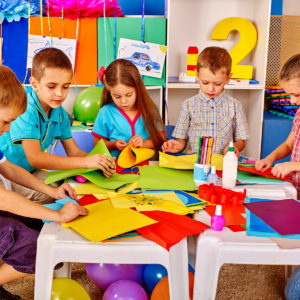It’s a policy question that puzzles parents across the country: When is a room packed with children during a coronavirus outbreak a good thing?
The answer, according to many elected officials like New Hampshire Gov. Chris Sununu, is when it’s a daycare center — and not a public school.
And so while Sununu ordered all public schools closed — and pressured private schools to close as well — a week ago to prevent the transmission of COVID-19, he’s leaving the state’s daycare facilities untouched. Children can’t gather at their local elementary school, but they can at childcare centers and private homes across the state.
What gives?
“These daycare centers aren’t large. They’re smaller in size, they’re more manageable, sometimes they work in shifts, and they use pre-screening tools now as kids come in,” Sununu explained at a coronavirus press update on Thursday. “We feel very confident we’re doing everything we can to ensure that this population is safe, that it’s not going to be a transmitting population. But our workforce is going to be critical as we move forward, especially the healthcare sector.”
And it’s that last point — the need for the healthcare, public safety and other vital members of the workforce to have child care — that appears to be Sununu’s priority.
“Our daycare and childcare centers are vital to allowing people to stay in the workforce, especially healthcare professionals. We’ve heard a lot of requests from parents in the workforce saying please, if these [daycare] facilities were to close they aren’t able, essentially, to go to work.”
And it’s not just Sununu. Oregon Gov. Kate Brown, called “the nation’s most progressive governor” by the liberal HuffPo website, is pursuing a similar approach. Like Sununu, she’s banned large gatherings, shut down restaurant dining and closed schools, while at the same time promoting the use of daycare services.
“We’re working on a plan for child care at least for essential workers,” Brown said, “that there are daycare sites available for them to go and be safe.”
In fact Sununu has relaxed state regulations to make it easier for daycare centers to expand and, theoretically, put even more young children under the same roof. Brown has gone a step further, requiring schools to provide childcare for high-priority workers and ordering state agencies to cooperate with daycare providers. This includes making subsidy payments for low-income children, even if they stop attending.
While keeping healthcare workers and first responders on the job may be necessary, there’s another group of workers who aren’t happy about this approach: The child care workers themselves.
In Massachusetts, for example, nearly 24,000 child care workers signed a petition urging the state to shut down daycares over concerns about caregivers contracting the coronavirus.
The Massachusetts Association for the Education of Young Children issued a statement: “We have heard lengthy conversations about college and university response plans to COVID-19, but it is frustrating and shocking that child care programs, both centers and family child care, have been overlooked in efforts to keep our communities safe.”
Not long after, Massachusetts Gov. Charlie Baker ordered daycare centers to close. His fellow New England Republican Phil Scott ordered Vermont’s daycare centers closed, too. But tellingly, his executive order explicitly requires child care services remain available for “essential persons working in response to the crisis.”
“I am flabbergasted,” Denver daycare operator Chelsea Moran wrote in a letter to Colorado Democratic Gov. Jared Polis when his administration issued widespread closings but encouraged daycare workers to stay on the job.
“This information flies directly in contradiction to everything else being released by the governor’s office. Please help me understand how closing the ski resorts through executive order is warranted, but allowing dozens and dozens of children in an enclosed area is OK?”
So what’s the right call? Cindy Lehnhoff, director of the Virginia-based National Child Care Association, tells InsideSources that having just one answer is the wrong answer.
“It has to be an individual choice of child care owners and parents. We are seeing reduced attendance, so maybe parents are already making their decision.”
She is also pushing for federal funding to help struggling daycare operators survive the social-distancing damage to their businesses. “Most people don’t know it, but 93 percent of childcare centers are small businesses. The big chains only account for about seven percent. If childcare centers can’t open and we don’t do something to help keep them in business, when this crisis passes, we won’t have the childcare infrastructure we need to get America working again.”
As for the safety of the workers she represents, Lehnhoff says she’s talking to daycare owners who are letting their employees decide for themselves if they feel comfortable working. “The reduced attendance is making it possible for owners to be flexible. Still, they keep showing up.
“Childcare workers are a different bunch — a very committed bunch,” Lehnhoff said.

